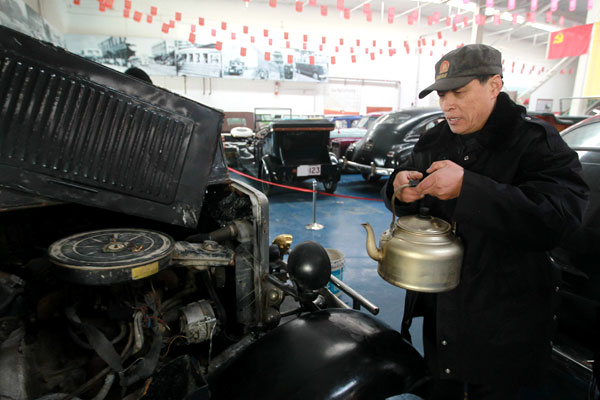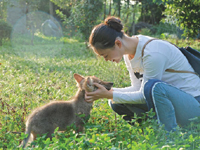Wealth on wheels
Updated: 2013-01-17 13:38
By Xu Lin (China Daily)
|
||||||||
 |
|
Luo Wenyou personally maintains the vintage cars in his museum. |
Luo is a relentless pursuer of cars through garages or friends all over the country.
Once, when a car owner was not willing to sell, Luo made friends with him, communicated with him often and even did housework for him. Six years later, the owner was finally touched by his sincerity and sold him the car.
It's expensive and difficult to transport these cars. In the 1990s, when he was transporting a classic car from Dandong, Liaoning province, in winter, he had to keep adding water because of a malfunction of the truck he drove. When he went to get water from a river at night, he fell into an ice hole and was nearly drowned.
As a successful businessman who used to own three small enterprises - a car repairing factory, a transportation company and a kart racing track - he bought his first vintage car at the age of 24, with 5,000 yuan, to drive as an ordinary automobile.
Three years later, he bought his second vintage car and started his bittersweet journey as a collector. By 1998 he had about 50.
That year was a turning point, when the Louis Vuitton Classic China Run was held in Beijing. Among the 50 competitors, Luo was the only Chinese - and the first ever to be part of such an international contest, he says.
After rubbing shoulders with other racers, he learned about classic-car organizations, museums and regular races abroad.
|
|
He is always moved wherever he drives a Red Flag: throngs of Chinese gather on the road to watch the car. Once an old man who was carrying his granddaughter in his arms got so excited applauding the car's appearance that he dropped the girl on the ground.
"Chinese people like Chinese classic cars very much. I feel responsible to boost the development of vintage cars in China," says Luo, who began to focus mainly on Chinese classic cars after that.
As soon as the contest was over, he sold his enterprises at a low price and established The Classic Car Association in Chengde, which turned into the Automobile Collecting Committee under China Association of Collectors in 2006. It attracted more than 500 members and now numbers about 3,000.
He moved from Chengde to Beijing in 2002, to communicate better with car fans. Seven years later, he spent about 8 million yuan establishing the museum, despite the strong opposition from his family and friends.
He says he never could have succeeded without the full support of his wife.
"His hobby costs a lot of money. He's very persistent and can bear any hardship for his dream, after struggling for a long time I changed my mind to support him," says his 57-year-old wife, Yang Yijun, who retired early to help Luo found the museum.
"Although our material lives can never be compared with the past, our spiritual lives are greatly satisfied by the praise and encouragement from the public," she says.
Now, money is Luo's biggest headache.
Income from the entrance fee - 50 yuan per visit - is a mere drop in the bucket. He has to rent his cars to film and TV series crews at nearby studios to make some money.
He earns about 1,000 yuan for an appearance as a walk-on to drive a vintage car, and there are usually four or five such opportunities per month. He appeared in many films, such as The Founding of a Republic and Beginning of the Great Revival.
To save costs, Luo and Yang do all the work in the museum. They are cleaners, ticket sellers, guides, receptionists and janitors.
Luo says he hardly has time to rest. Even when he's not busy, there are many cars to be repaired.
For the past 14 years, he says, his wife has never bought new clothes or been to shopping malls, and they have never traveled around.
"We have no money or energy to go traveling. Whenever I have some money, I will spend it on repairing the cars," he says.
His classic car association now often interacts with foreign associations and organizes activities every year.
"Few people in China know about the classic car culture, which not only reflects the history of Chinese cars, but also promotes the modern automobile's development. Compared with the mature classic car industry abroad, there's still a long way to go in China."
Contact the writer at xulin@chinadaily.com.cn.

 'Taken 2' grabs movie box office crown
'Taken 2' grabs movie box office crown
 Rihanna's 'Diamonds' tops UK pop chart
Rihanna's 'Diamonds' tops UK pop chart
 Fans get look at vintage Rolling Stones
Fans get look at vintage Rolling Stones
 Celebrities attend Power of Women event
Celebrities attend Power of Women event
 Ang Lee breaks 'every rule' to make unlikely new Life of Pi film
Ang Lee breaks 'every rule' to make unlikely new Life of Pi film
 Rihanna almost thrown out of nightclub
Rihanna almost thrown out of nightclub
 'Dark Knight' wins weekend box office
'Dark Knight' wins weekend box office
 'Total Recall' stars gather in Beverly Hills
'Total Recall' stars gather in Beverly Hills
Most Viewed
Editor's Picks

|

|

|

|

|

|
Today's Top News
Boston bombing suspect reported cornered on boat
7.0-magnitude quake hits Sichuan
Cross-talk artist helps to spread the word
'Green' awareness levels drop in Beijing
Palace Museum spruces up
First couple on Time's list of most influential
H7N9 flu transmission studied
Trading channels 'need to broaden'
US Weekly

|

|









